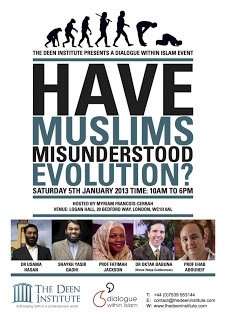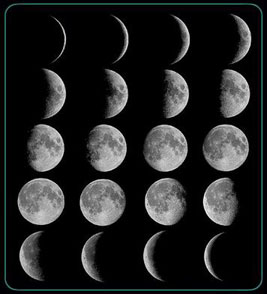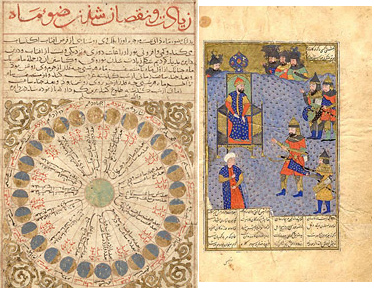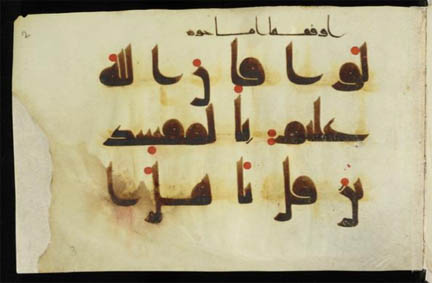
There is a valuable resource available for anyone interested in the interchange between Arabic texts and the Latin-writing world. This can be found at http://www.arabic-latin-glossary.philosophie.uni-wuerzburg.de/?nav=r&page=1

There is a valuable resource available for anyone interested in the interchange between Arabic texts and the Latin-writing world. This can be found at http://www.arabic-latin-glossary.philosophie.uni-wuerzburg.de/?nav=r&page=1

Top of page from 1347 CE copy of Miftah al-‘ulum of al-Sakaki in the al-Aqsa Mosque Library
The British Museum is sponsoring a project to digitalize Arabic manuscripts in the al-Aqsa Mosque library of Jerusalem. Details below and at their website:
EAP521: Digitisation of manuscripts at the Al-aqsa Mosque Library, East Jerusalem
The main goal of this project is to preserve the historical manuscript collection housed at the Al-aqsa Mosque Library in Jerusalem. The Al-aqsa Library located at the heart of the Old City of Jerusalem serves as a primary research center for Islamic studies and as a reference library for scholars and students from Jerusalem and other Palestinian cities. The library’s rare and most valuable collection consists of approximately 2000 manuscripts. The manuscripts were acquired by the Al-aqsa Library from prominent scholars, private collections, and from libraries in Palestine that have ceased to exist. The materials selected for this project represent 119 manuscript titles in the most immediate need of preservation.
EAP521/1: Al-Aqsa Mosque Library Collection of Historical Manuscripts [12th century-19th century]
“This manuscript collection contains 119 Arabic language titles that span over several Islamic periods from the 9th century CE to the end of the Ottoman rule in Palestine at the beginning of the 20th century. Most of the manuscripts relate to aspects of the Islamic religion, but also cover Arabic literature, the Arabic language, logic, math and Sufism and provide a unique insight into centuries of Arabic culture in Palestine. The numbers of pages of original material represent double pages, often librarians of islamic manuscripts use one number for every two pages. ”
Digitisation is planned primarily as a means of preservation in order to create high-quality archival digital copies of the original source materials that are at risk of deterioration. Environmental factors, wear and tear of manuscripts due to poor storage conditions, the lack of security at the library, and the unstable political situation in Jerusalem contribute to the sense of urgency and make digitisation of these unique manuscript materials a top priority. Continue reading Al-Aqsa Arabic Manuscripts Going Online

The importance of Evolution and Islam debate in London
by Salman Hameed, Irtiqa’, January 7, 2013
I’m now back in US and I’m glad that I had a chance to attend the London debate, Have Muslims Misunderstood Evolution? It was organized by The Deen Institute and I posted some quick thoughts on Saturday.
You can find a good summary of each speaker’s presentation at Farrukh’s blog.
Here are a few reasons why I think the London debate on evolution and Islam may turn out be a game-changer in the way Muslims look at evolutionary biology, and science, in general.
This was an intra-faith debate. There is no question that the topic was controversial. However, the conversation on evolution often gets derailed by common misconceptions and juvenile creationist ideas. The debate would have been a failure, had it been simply between biologists and those who follow Harun Yahya. There is no common ground – as Yahya’s group has no understanding of science.
The reason for the success of the debate was that almost all of the speakers (with the exception of Harun Yahya acolyte, Oktar Babuna) accepted the scientific consensus on evolution. Then the question became: Can Muslims reconcile human evolution with their faith? Now this is an important question.
Here are a few take-aways from the London debate: Continue reading Have Muslims Misunderstood Evolution
click here.]
The legal opinion of Qadi Shakir
Egyptian qadi Ahmad Muhammad Shakir (who was to become President of the Egyptian Supreme Court of the Shariah at the end of his career, and who remains to this day an author of reference in the field of hadith) (9), wrote a lengthy legal opinion in 1939 on the subject of the Islamic calendar, entitled : “The beginning of Arab months… is it legal to determine it using astronomical calculations?â€. (2) According to him, the Messenger took into account the fact that the Muslim community of his time was “illiterate, not knowing how to write nor how to count”. So, he recommended to its members to observe the new moon to carry out their religious duties at the time of fasting and hajj. But the community evolved considerably over time, and some of its members even became experts in astronomy.
According to the principle of Muslim law which states that “a rule is no longer applicable, when the factor which justified its existence has disappeared”, the Messenger’s recommendation didn’t apply anymore to the Muslims, after they had learned to read and count and had ceased being illiterate. Therefore, according to Shakir, contemporary ulama’ commit an error of interpretation when they give to the Messenger’s hadith the same interpretation that applied at the time of Revelation, as if the hadith prescribed immutable rules. But, it has stopped being applicable to the Muslim community long ago, based on the principles of the shari’ah themselves. Continue reading The reform of the Islamic calendar: the terms of the debate, #2

[Note: This is a two-part article. After reading this you can proceed to Part two by clicking here.]
by Khalid Chraibi
Shortcomings of the Islamic calendar
A calendar associates a specific date with each day of any given week, month or year, to enable people to manage all their activities over an extended period of time. They must be able to anticipate, plan and organize in advance, using the information provided by the calendar, everything that they need to do. But, in Muslim societies, people wait to see, each country for itself, the appearance of the new moon at the end of each lunar month, before they declare the beginning of a new lunar month. As a result:
– the information in the Islamic calendar does not extend beyond the current month;
– and the data it shows each month differs from one Muslim country to another.
For instance, the first day of Ramadan 1427 corresponded to Saturday, September 23, 2006 in 20 countries ; Sunday, September 24 in 46 countries ; and Monday, September 25 in 5 countries. (1) This situation is in no way unusual, but can be observed every month.
Because of these shortcomings, after the major Muslim countries were occupied by foreign powers in the 19th and 20th centuries, Muslim people started using the Gregorian calendar to meet all their needs, and only care about determining Islamic dates on momentous Islamic religious occasions.
But, to this day, they regularly get puzzled at the inability of the Islamic calendar to predict precisely, well in advance, the day on which major Islamic events such as the first day of Ramadan, or eid al-fitr, or eid al-adha, or the first day of the new Islamic year are to take place. Continue reading The reform of the Islamic calendar: the terms of the debate, Part 1

Has your atlas arrived yet? The New York Times reported yesterday that prominent American scientists and politicians are receiving what purports to be an “Atlas of Creation” from a Turkish media guru self-named Harun Yahya. No, it is not revenge for the “War on Terror.” Nor is a glossy book of patent nonsense, no matter how intelligently designed and styled as “probably the largest and most beautiful creationist challenge yet to Darwin’s theory” much of a challenge. Scientists will recognize it for a “load of crap,” as Kevin Padian, an evolutionary biologist at the University of California, Berkeley, impolitely phrased it.
The “War on Terror” has manufactured a whole host of new enemies. But what a strange bedfellow is Charles Darwin, who liberated science from the dogmatic demands of religious apologists like Mahdi Yahya a century and a half ago. Darwin’s approach now summarizes all of modern science, a steady advance in knowledge because no specific idea is ever held sacred. This does not mean that scientists must abandon religion and faith, but it does offer a view of the world in which human reason is not abandoned under the cloak and rhetorical dagger of a supposedly spiritual quest for moral behavior. Continue reading Tabsir Redux: Mahdi as Hell…

left, Illustration of the phases of the Moon (Or. 133, Golius collection) ;right, Firdawsi, Shahnama (15th century, Or. 494)
There are thousands of Middle Eastern manuscripts preserved in European libraries. One of the famous collections is that of Leiden University. Imagine if those were available online? It would be a dream come true for budding scholars and the old guard alike. A dream, indeed. Leiden University has joined with Brill to provide this collection online, but at a cost. The price posted is a mere (I mean only an emir can afford it) $25,900. I suspect it will take only a few sales to recoup the costs of onlining the manuscripts (and perhaps onlining the profits of both the Leiden libraries (a worthy cause) and Brill (a publisher that already charges so much that few can afford their books). Actually, it may be cheaper to matriculate at Leiden University, since university members have free access.
For those who are interested (either to lament or to have lots of money and little to do with it), here are the details:
Continue reading The Cost of Orientalism

The Cambridge Digital Library now has online access to some of their Islamic manuscripts. Details below, as described on the website:
Cambridge University Library’s collection of Islamic manuscripts dates from the origins of Arabic scholarship in Cambridge in the 1630s when the University founded a Professorship in Arabic and William Bedwell donated a Qur’an to the Library. Since that time the collection has grown in size and diversity to over 5,000 works, including the collections of Thomas Erpenius, J.L.Burckhardt, E.H.Palmer and E.G. Browne. These manuscripts shed light on many aspects of the Islamic world, its beliefs and learning.
The collection was further enriched over the centuries through the activities of scholarly collectors and skilled librarians, adding more depth to the already impressive range of manuscripts. Yet this extraordinary collection has remained relatively unknown outside Cambridge. Now we hope to draw better attention to its treasures through cataloguing and digitisation. We have collaborated with the Bodleian at Oxford and other research libraries to provide an online catalogue of the collection. We will be offering a selection of digitised manuscripts through the Foundations project and will seek funding for further digitisation. Continue reading Islamic Manuscripts at Cambridge